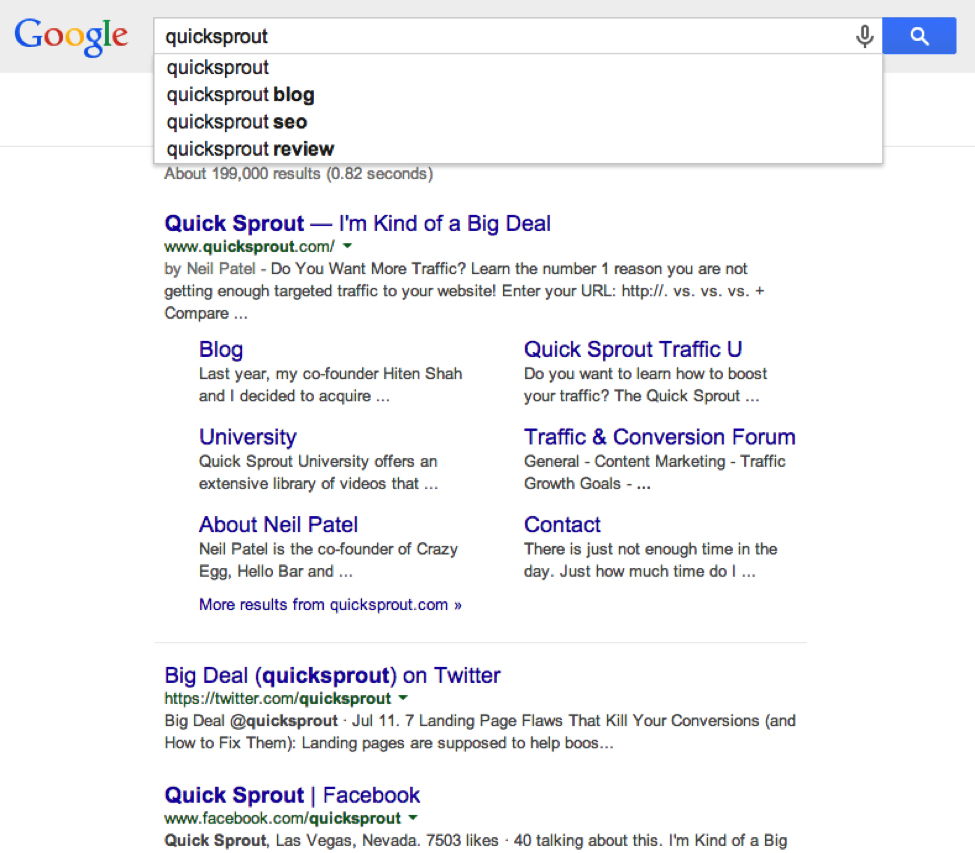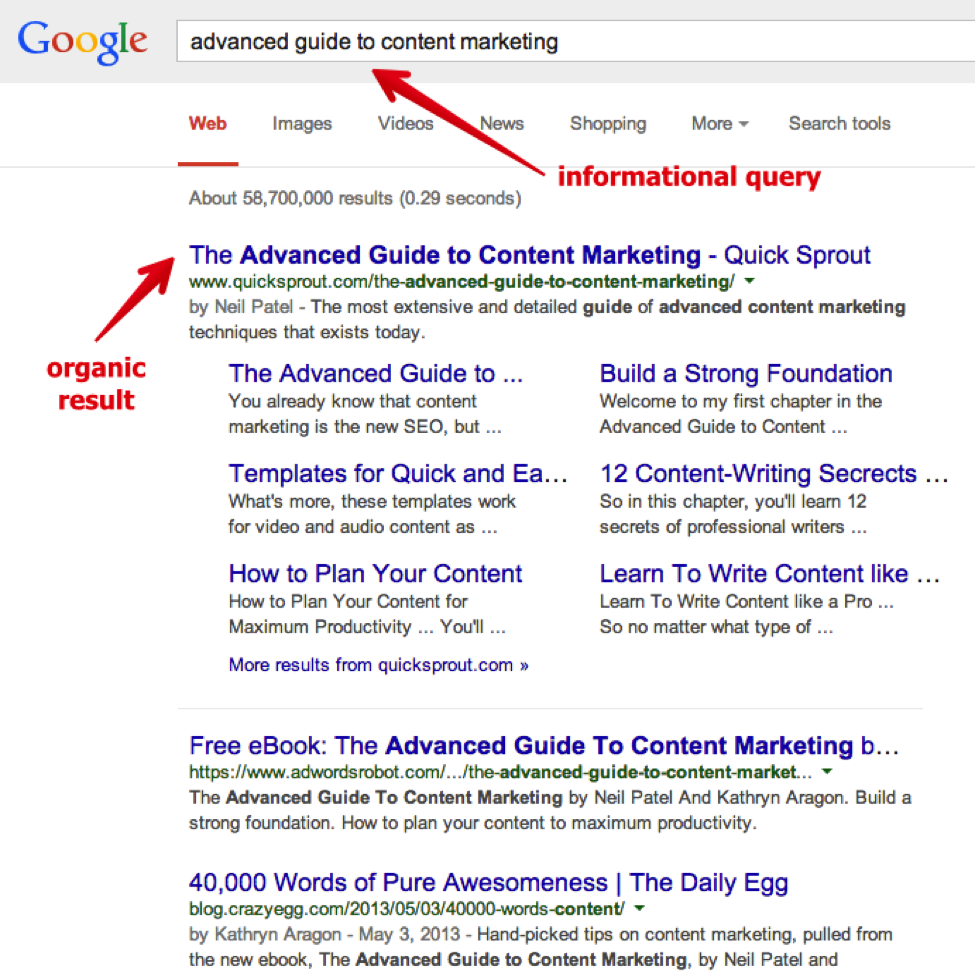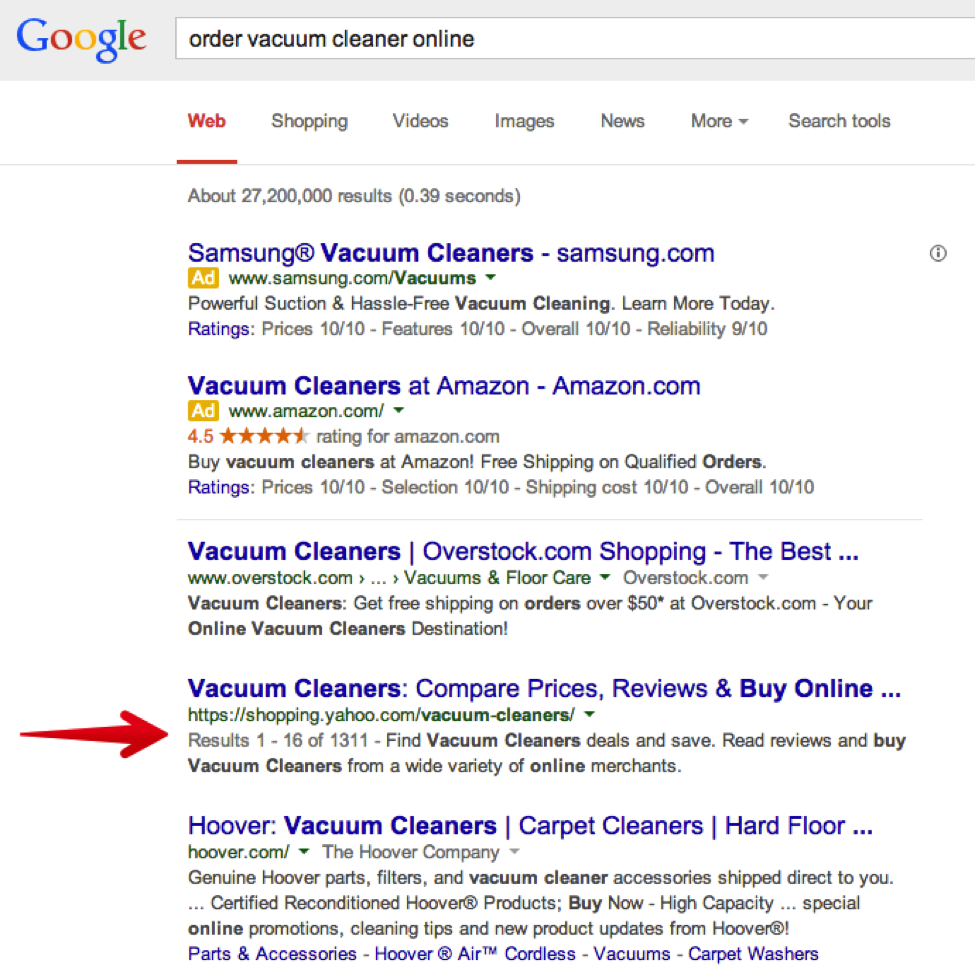 Though Google gets roughly 3.5 billion searches a day, there are really only three types of searches that people perform — navigational, informational, and transactional. If you want get more people to find you in search, you need to know how to optimize your content for each of these types.
Though Google gets roughly 3.5 billion searches a day, there are really only three types of searches that people perform — navigational, informational, and transactional. If you want get more people to find you in search, you need to know how to optimize your content for each of these types.
In this article, I’m going to explain each of the three types of searches and give a bit of perspective on why each one is important. Then, I’ll provide you with some tactical methods for unleashing a strategy that will allow you to dominate the SERPs for that search type.
Navigational Search
What It Is
A navigational search is when a user searches for a specific website by typing in the name of that website (not the URL).
Someone who wants to find my site, Quicksprout, might perform this navigational search:

They did not type in the address: “www.quicksprout.com.” They typed in the name of my company using a search engine or maybe just the browser bar.
Why It Matters
Navigational search is used by new and repeat visitors.
The point of origin for many searches is the browser’s address bar. If you want to buy a book of Amazon, you might do something like …
- Open a new tab on your browser
- Type in “Amazon” in the address bar
- Hit “enter.”
You just performed a navigational search. Search engines and browsers make it easy to find a website with a few quick keystrokes. Why pull up a bookmark when you can type in ”quicksprout” with ease?
The searchers who find your site by typing in your site’s name are both new and repeat visitors, but they are mostly repeat visitors. They already know the name of your site. How else would someone know how to type in “quicksprout?” It’s not exactly a normal word or an informational search.
But there are also new visitors who may have heard of the site or seen it mentioned elsewhere. They, too, will find the site using a navigational search, often with some hybrid informational keywords thrown in for good measure, like these:
- quicksprout neil patel
- quick sprout seo
- sprout quick seo advice
- advanced guides sprout
Navigational search is used by searchers who are more likely to convert.
Your branded keywords are some of your most important. Why? Because they help the people who are looking for your site to find your site.
These are some of your most valuable visitors! Time and again, visitors who land on my sites using branded or navigational searches are far more likely to convert. They know what they want, and they are searching for it. They are ready to convert.
How to Dominate It
Just be.
As long as you have a unique brand name, you stand a strong chance of dominating the SERPs for your navigational keyword. It’s not too hard.
Google’s algorithm is designed to award navigational searches — most of the search results point directly to the site that the user was navigationally searching for.
Here’s how a Wordstream blog post put it:
“Keyword searches with organic links, which tend to be branded/navigational searches — appear to be showing 7 or fewer organic listings, instead of the usual 10.”
The upside of this?
“[These] top 7 listings in branded/navigational searches have an increasing tendency to be from the same domain(s).”
If that’s not domination, I don’t know what is.
Even though you can accomplish navigational search domination without severe backbreaking effort, you still need to do some things right.
Use the navigational keyword in your page title (without keyword stuffing).
Titles, the most important SEO feature of any given page, should contain your navigational keywords (without feeling unnatural). Even though my slogan is “I’m kind of a big deal,” I know that my brand name should be featured on my page title. Thus, I use “Quick Sprout – I’m kind of a big deal” as my title. This brings in the navigational queries that are looking for “quicksprout,” “quick sprout,” or even “sprout quick.”

Emphasize your brand name.
In today’s search world, brand identity matters more than ever. Brands are now competing for keyword space, not in the traditional informational arena, but in the marketing and brand-related sense. Brand stature is everything.
The more you can saturate the market with your brand identity by creating quality content, the better time you will have of embedding your brand name into the minds of searchers, and therefore gaining more future navigational searches.
In earlier days (circa 2008) the vast majority of searches were informational, which led to the meteoric rise of content marketing a couple of short years later. Today, instead of the paltry 10% of search market share it used to have, navigational search is much more dominant and much more important today.
Your brand name is a great search handle — your strongest even. Use it, promote it, protect it, and optimize the heck out of it.
Informational Search
What It Is
Informational searches are those in which the user is looking for information — how to make a strawberry pie, how long to make a title tag, the height of Pike’s Peak, the best surfboard wax, etc.
An informational search looks like this:

Informational searches in a post-Hummingbird era include a wide array of semantic attributes that implement search intent and contextual meaning.
Informational searches are vast and unwieldy because of their huge number, huge variety, and complex semantic attributes. Semantic searches receive search results that are massaged and tweaked by the algorithm in the following ways:
- The algorithm adjusts for morphological variation.
- The algorithm adjusts for contextual synonyms.
- The algorithm handles generalizations.
- The algorithm provides concept matching results.
- The algorithm provides knowledge matching results.
- The algorithm understands natural language queries and interrogatives.
Google’s Knowledge Graph is the most noticeable semantic search implementation in the search world. Its ability to translate, parse, and deliver intelligent results in the Knowledge Graph is a direct attribute of its finely-tuned semantic search capabilities.
Why It Matters
Informational searches are the rubber-meets-the-road of SEO. This is where the power of content is truly unleashed.
How to Dominate It
In order to dominate informational searches, you have to dominate inbound marketing. It’s just that simple. This article makes no pretense to being a guide to inbound marketing. You can read about that in another guide.
Create a domain or brand that uses it.
One way to get more informational searchers to your site is to create a domain or brand name that includes that informational search query.
Let me illustrate this by using “content marketing” as an example. If I search for “content marketing blog,” I’m obviously looking for some information on content marketing — most likely a good blog or website that has some things to teach me about content marketing. Here’s what I get:

Content Marketing Institute dominates the SERPs. They have a domain and brand name that takes ownership of the informational keyword, forcing the algorithm to deliver it in the results. Remember how Google’s algorithm is designed to favor branded or navigational searches? Since that is true, and since the Content Marketing Institute has the term “content marketing” in their brand name, they pop to the top of the results — the first three organic results, as a matter of fact.
Claiming a brand or domain with your target keyword doesn’t work for everyone. I don’t recommend it as a must-have, but if it does play into your overall brand strategy, then you’ve got a leg up.
The one place where you should emphasize brand/informational keyword ownership is with your personal name. Your name is your most valuable asset for personal branding, and you should use it as part of your domain if possible.
Define your niche.
Your most important effort is to define exactly what keywords you want to dominate. You only need to focus on the set of keywords that your target audience is searching for.
Once you know what keywords you’re going to target, you can start to own them through content domination on that topic. If you create more articles, in-depth information, infographics, videos, and images on a topic than anyone else on the planet (and they’re quality), you will dominate the SERPs for that topic.
Build your domain authority.
Successfully gaining informational search volume is going to be hard unless you have domain authority. The only way to build authority, of course, is through consistent content marketing and earned off-site links.
Create pages that contain relevant keywords in the URL.
When it comes to SEO, your URL is a powerful feature for gaining informational search. The algorithm favors search results that implement the target keyword. Notice how this works out in this general one-word query for “truck.” The first organic result is Wikipedia, obviously, then some Knowledge Graph news, and then this:

These sites have strong domain authority and rich content on their websites, but they also have a strategic URLs. Each URL includes the target keyword, thus creating an entry into the SERPs. In essence, the URL “brands” the term — the URL creates an algorithmic identifier of ownership over that particular keyword.
If you are targeting a certain keyword, I recommend making pages that use that keyword explicitly. (Though, as always, this should feel natural — not spammy.)
Transactional Search
What It Is
Transactional searches are those in which the searcher is searching for something that they are prepared to purchase or convert on. I call these “wallet-out, ready-to-buy” searchers. They are positioned precisely at a point in the buying cycle where they are willing and prepared to spend money. Landing pages and product pages target this kind of search.
Here’s an example:

Many times, the searches use terms like “buy,” “purchase,” “price,” “promotion,” “deal,” “discount,” etc. Either way, the algorithm intuits that the user wants to make a purchase, so it provides SERP information that is relevant to a purchase.

Why It Matters
Transactional searches reflect a user’s desire to buy something. They are prepared to convert. Little needs to be done to push them over the edge.
Although these searches comprise the least amount of search volume, they are the most conversion-ready.
How to Dominate It
“Dominate” in the context of transactional searches is not easy. In fact, unless you have a really, really niche product, complete SERP domination is impossible. You can, however, vastly improve your SERP appearance with the following techniques.
Use schema markup.
Most transactional searches have Knowledge Graph results in Google. You need to be using markup if you want to land a spot on the product carousels, produce price displays, or feature other KG information.
Google has proved already that it prefers sites that have markup. If you are not using markup, you are neglecting a chance to gain a spot in Google’s informative and relevant results.
Create information on the product that includes transactional keywords.
Google rewards content over against strictly purchase pages. If you want to gain the attention and search traffic of transactional users, create content surrounding their transactional query.
For example the query “order vacuum cleaner online” is obviously transactional. However, Yahoo’s shopping site has scored some serious content points by creating a page with information — comparing prices, reading reviews, finding deals, etc.

The transactional user will be interested in this content, because it is both transactional and informational. The user’s end goal is to buy, but the page promises information that will make the purchase even better.
Conclusion
Although search engine optimization has changed a ton over the past few years, the three main types of searches haven’t changed. Searchers are still using navigational, informational, and transactional searches to get what they want.
For you, the business owner, SEO, or marketer, it boils down to this: Give users what they want. Create content and information that the user is searching for.
The better you do that, the more you’ll dominate.
How do you optimize for each of the three types of searches?
![]()







